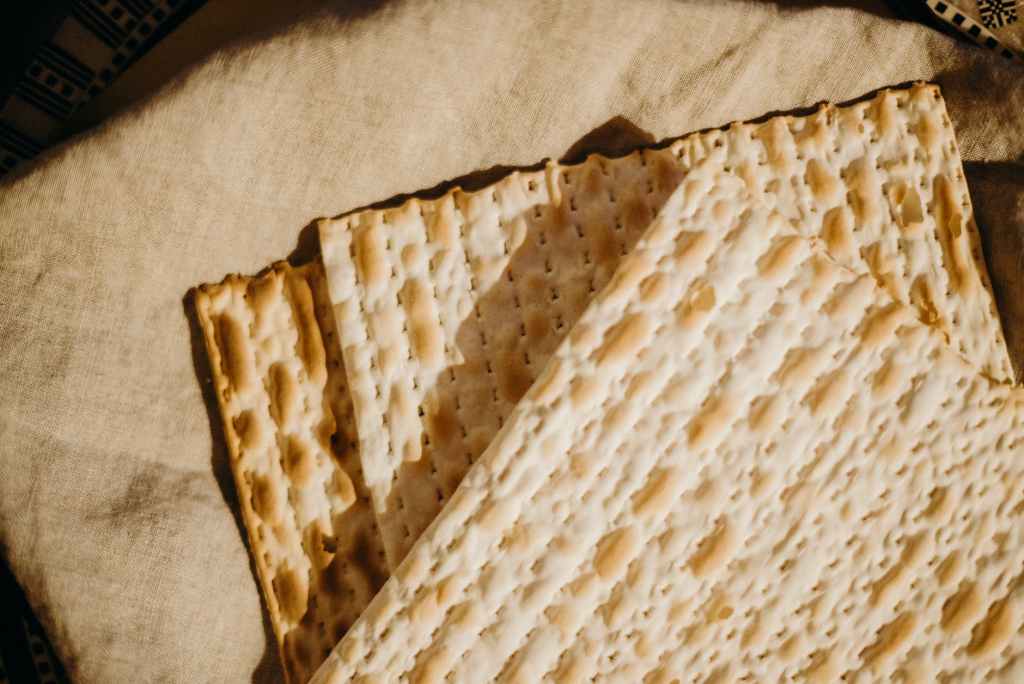Jesus is the afikomen
He is the Broken Bread
It is by His stipes we are healed
That we may live instead.
The holes remind us He was pierced.
His hands and feet they nailed
Upon the cross, and with a spear
They pierced His side and wailed.
The blackened marks of the flatbread
Remind us He was whipped
With thirty-nine lashes of pain.
From His robe He was stripped.
He was unleavened, without sin
And baked by earth’s hot trials.
He was set apart by God’s will
For all men to revile.
Wrapped into white linen cloths
And hidden from men’s eyes.
His risen self did children see
But not the strong or wise.
His linen facecloth, folded neat,
Was set off to the side
For Peter and John then to find,
For death He had defied.
Jesus is the afikomen
May we like children too
Find the hidden things of God
And find Messiah: You.
As we are in this Lenten season, preparing for Easter, I find it appropriate to share this poem as Jews also are preparing for Passover. This poem comes from an interest my husband and I began pursuing, that is, the Messianic connections of Passover to Jesus. It is a passion of mine to scour the Scriptures and even traditions to find hints and shadows of the Savior. It’s not so much that I began trying to read my assumptions into the Passover story as it is that I learned a little bit about the Seder and suddenly the symbolism jumped out at me. I think I shouted, “That’s Jesus! He’s been in the Seder all along!” I’m sure Jesus is up in heaven slapping His head and saying, “Didn’t I tell you that this is my body and my blood like 2000 years ago?” But He is in all the details of the Seder that are not necessarily recorded in Scripture. For example, the afikomen is the middle piece of matzo in a stack of three which is broken early in the meal and part of it is set aside and hidden until the end of the meal. The children get to go find it later and it’s like the dessert after the meal. Well, you know what jumped out to me is that the three pieces of bread are the Trinity! I know they represent the Patriarchs too in Seders today, but hear me out. Jesus is the second person of the Trinity, and His body was broken for us. He was wrapped in white linen just like the afikomen, and He was laid aside in a tomb just like the afikomen is hidden. The disciples went searching and found Him and his burial clothes after He was raised. The children go searching for the afikomen after the meal. Jesus said, “I thank you, Father, Lord of heaven and earth, that you have hidden these things from the wise and understanding and revealed them to little children; yes, Father, for such was your gracious will” (Luke 10:21). See also Matthew 11:25-26. We must be like children to find the kingdom of God (Matthew 18:2-3, 19:14, Mark 10:14-15, Luke 18:16-17), just like the children go to find the afikomen. Oh thank you Jesus! I so fervently pray that at the last, Israel will find their dessert! Jesus is the dessert after the whole meal. He is the One we have been looking forward to.
As a backstory in my love for finding Jesus in the Seder, during the summer of 2014, I felt strongly led by God to pray through the Psalms for Israel and spiritual warfare. I had no idea what was about to happen in that land, the 2014 Jerusalem Unrest or the Silent Intifada. The Lord truly is the best source of intelligence, isn’t He? And He alerts His people on a need-to-know basis. For some reason He called me to be a prayer warrior specifically for Israel. I don’t know why. I mean, I guess all Christians are supposed to pray for Israel. But that summer, He placed a heart in me that I did not have before for these people that I have basically no personal connection to. I want to emphasize that God called me to pray against spiritual warfare, because “we do not wrestle against flesh and blood, but against the rulers, against the authorities, against the cosmic powers over this present darkness, against the spiritual forces of evil in the heavenly places,” (Ephesians 6:12), and “the weapons of our warfare are not of the flesh but have divine power to destroy strongholds” (2 Corinthians 10:4). God did not call me to pray against the people known today as the Palestinians. Jesus died for them. They are like hostages in the invisible war. He called me to pray against the powers of darkness waging a war behind all the physical conflict we see. I also had a very disturbing and vivid dream in early 2020 of two women in the Gaza Strip who were desperately trying to escape, but there was no way out. I won’t go into any more detail about that dream other than to say that I rarely have dreams that vivid and detailed and I felt their terror. Shortly after, I read the news about rockets being sent from Gaza into Israel. God wants me to pray for the Palestinians now too. I have to admit they were not on my radar either, not until that dream He gave me. Since then, I have made a point to pray for and support evangelical missions however I can in the Gaza Strip and to pray for the believers who are there, because they are persecuted so severely. So if you feel God is leading you to do something (in accordance with Scripture of course), then just do it.
Reference
The Bible. English Standard Version, Crossway, 2001.
